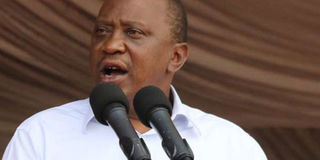Crucial issues that await President Kenyatta after oath

President Uhuru Kenyatta speaks at Rukenya, Kirinyaga County, on November 23, 2017 after launching the construction of Thiba Dam. His first assignment will be to unify a country that has been sharply divided by politics of ethnicity. PHOTO | JOSEPH KANYI | NATION MEDIA GROUP
What you need to know:
- Nasa will be holding a meeting in memory of their supporters who were killed in street protests.
- Ethnic divisions, partly fuelled by a diabolical social media platform, have widened.
- The economy has been badly battered by negative and lengthy electioneering period and will need some fixing.
On Tuesday, as President Uhuru Kenyatta takes the oath of office for his second and last term, he is faced with a plethora of questions regarding his re-election.
In Wars Guns and Votes, Paul Collier says: “Elections are the institutional technology of democracy. They have the potential to make governments both more accountable and more legitimate.”
Pundits are asking how accountable and legitimate the second Jubilee administration is.
This is because nearly half of the country is not satisfied with the Jubilee victory.
MEMORIAL SERVICE
As the swearing-in ceremony takes place in Kasarani, slightly 10km away at Jacaranda grounds, Raila Odinga’s Nasa will be holding a meeting in memory of their supporters who were killed in street protests.
It is also happening when parts of the country are speaking of secession - yet the Constitution avers a single united nation.
Thus, President Kenyatta’s first assignment will be to unify a country that has been sharply divided by politics of ethnicity – and a winner takes all political system.
Ethnic divisions, partly fuelled by a diabolical social media platform, have widened.
UNITY
On bridging this gap, the President will have no option and will need to talk to Mr Odinga and his team to find an acceptable way out of the current political conundrum.
Perhaps this is why on Sunday he said the inauguration is not about his victory, but about the nation’s diversity, peace and unity.
“Like in any competition, there will be winners and losers but in case of the election, Kenyans are winners. Our responsibility after the political competition is to come together and work to build the nation,” he said.
GROWTH
The economy has been badly battered by negative and lengthy electioneering period and will need some fixing.
The Kenya Private Sector Alliance has estimated that Sh600 billion could have been lost during the period as investors fled, and circulation of money got constrained.
As a result, prices of essential commodities rose, transportation costs escalated, and there was stymied production.
Also, revenue collection is on the ebb, and the national debt — both domestic and external — has hit the roof.
PUBLIC DEBT
None other than the International Monetary Fund has warned of possible economic shocks if the national debt is not contained.
IMF country representative Jan Mikkelsen said last week:
“The fiscal deficit needs to be reduced a little bit to make more room for the private sector and also to reduce the public debt pressure.”
Public debt has been on an upward trend in recent years, rising to Sh4.4 trillion by the end of September from less than a trillion shilling in mid-2014.
JOBS
Of course the economy can still grow as long as our acidic politics are fixed, the IMF man added.
“We still do see growth in the Kenyan economy quite resilient. It will of course assume that political stability returns to the country.”
On this, the President will require his economic team — and there are a good bunch at Treasury — to advise on the best practices to turn round the economy.
The third item on President Kenyatta’s agenda will be to make the Industrialization docket deliver on its mission.
The electioneering period exposed Kenya’s soft belly — millions of unemployed youth.
HEALTH CARE
Industrialization has to deliver jobs, substitute imports on which billions of shillings are spent, internships, value addition to farm products and produce good for export.
To be fixed are the cottage industries, export processing zones and getting the right people on the job.
Fourthly, the Health docket has been a blight on the Jubilee administration’s first term.
Strikes by doctors, nurses and other cadre of health workers has raised questions on the wisdom of devolving health.
He might have to initiate talks with governors on how better to guarantee Kenyans affordable health care.





